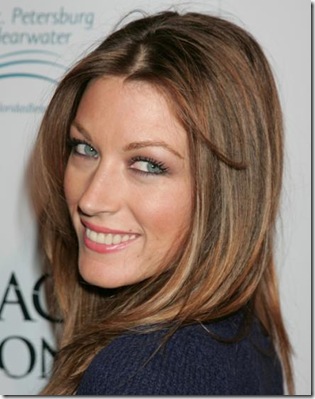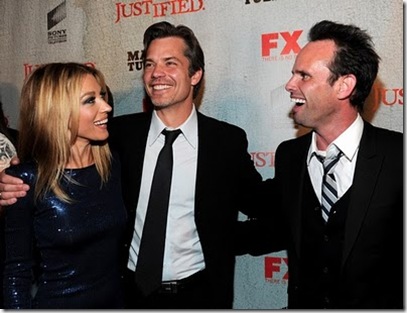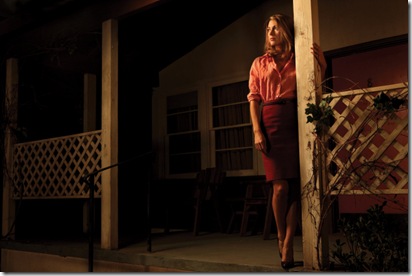Although Natalie Zea’s Winona hasn’t been seen that much thus far on the FX hit series Justified [Thursdays, 10/9C], it’s pretty clear that she’s an important part of the mix. Zea, who has done fine work elsewhere [Dirty Sexy Money, Eyes, The Shield], brings an unexpected weight to the role of protagonist Raylen Givens’ ex-wife – without sacrificing any of the character’s intelligence and sexiness.
I had the opportunity to take part in a teleconference Q&A with her on Friday and she proved to be as smart and perceptive as her character.
I’m so enjoying your character on this series. I’m so curious, I’m still fuzzy on exactly why you and Raylan divorced, your characters. And I was just wondering if you could talk about that and how you view it, and also the dynamic with you and Ava Crowder, Joelle Carter’s character in this first season, if you could kind of elaborate and tell us kind of where all of this is sort of going?
Natalie Zea: Well, I love that you’re enjoying my character, have you seen episodes I haven’t seen, because I’m so not there very much? I don’t know about how much we’re going to explore in terms of the divorce and why the divorce happens. But what I do know is from the book, “Winona” is left behind in Kentucky, while Raylan goes to Florida to set up sort of a new life for them and she is to sell the house and is selling the house. She ends up getting friendly with their realtor and ultimately leaving Raylan for said realtor, but I think it’s a lot more complicated than that. Those were just the sort of logistical terms and we’re not going to really talk all that much about it in this season. I think that that’s for, God willing, season two, I think we’re going to get much deeper into what really, really happened.
In terms of Ava and Winona, I’m really happy with how they’ve introduced the two of these characters to each other. It’s not catty, it’s not adversarial necessarily, it’s certainly not adversarial on the surface. And I think that we only share a few scenes, well, three scenes, one of the scenes she’s passed out, so we really only exchange words in two of those scenes. But it’s mostly all about what’s not being said, what’s being said sort of under the surface. I like how sort of subtle that relationship is.
How many scenes have you done with Walton Goggins’ Boyd Crowder?
Zea: Zero.
None?
Zea: None, sorry.
It must be really hard working with such an unattractive actor as Timothy Olyphant.
Zea: It’s awful.
It’s just got to be awful just to have to go to work.
Zea: I’ve stated it publicly and I will say it again, it’s torture.
Have you ever worked with him prior to this or is this the first time that you two have collaborated?
Zea: No, we’ve never worked together. I have auditioned for a couple of projects that he ultimately ended up being in, so there were a lot of near misses. And I’m now glad that I didn’t end up getting in any of those projects, because this town works in weird ways—
Right.
Zea: —and people don’t like to see you double up.
Right. So I guess we’re not going to see you back on Hung.
Zea: You might.
Maybe?
Zea: You might.
How did you become involved with the show and why did you decide to take on the role?
Zea: I read the script over a year ago, that’s for the pilot, and I really liked it because it was so different from anything that I had been reading during that particular pilot season. And I told my manager I wanted to see if we could fight for this, because it’s always a struggle. It was a guest star. We all kind of figured it would turn into something else, but we didn’t know and we were willing to take the chance. Once we found out Tim was involved, it just seemed like, it seemed silly not to pursue it.
They actually didn’t want to see me. So we had to kind of make some phone calls and get creative, and finally I got an appointment to go in and read; and I read and it was an awful audition and I forgot about it. And about a month later, I got the call saying that they were going to fly me out to Pennsylvania and I was going to shoot the pilot. And then it ended up, once it got picked up and once the ball started rolling, they had me on as a regular, which was really great serendipity.
The pedigree of having FX and Elmore Leonard and Tim Olyphant, it just seemed so silly not to really, really try and pursue it, because it seemed to be formula that you kind of couldn’t beat. So that’s how that happened.
We hear a lot about the show’s creators. Obviously it’s great to work with someone as talented as Graham Yost for example. This is your second show for FX, you did Hung on HBO, you did Dirty Sexy Money on ABC, how important is the network through shows to your career? Do you have much interaction with the network? How does that affect a show length?
Zea: I think it depends on the actor. For me the network is hugely important, because every network has a certain brand and a certain look and a certain feel. I think even more so than even in the past or maybe I’m just more aware of it now than I used to be. I decided after having done Dirty Sexy Money, which was, don’t get me wrong, an incredible experience and I’m so glad I did it, I felt like I wanted to do something somewhat different. I wanted to do something where the network wasn’t quite as involved in the creative process.
I did Hung and the network was not in any way illuming force on set. I never saw anybody from the network, I never got network notes, I never heard anybody talking about the network, and it was sort of this television utopia where the creative people are left alone. And I kind of feel that way about, no, I don’t kind of, I feel the same way about this show. I’ve never been aware of a network presence or aware of having to compromise or move things around or do things that are going to be more suitable for the network. I think that’s kind of how it should be.
A network is important for me. I think there are actors out there who would say that it’s not a factor, but that’s not the case with me.
What do you think sets Justified apart from some of the other television dramas that are out there?
Zea: I think Justified has a feeling that’s unlike any other show at least that I’ve seen. We’ve gotten into the habit, we in the television world, we’ve gotten into the habit of setting shows in New York and LA only. And there’s so much more going on in between those two coasts. I think it has this dark, yet mysterious, well I guess dark and mysterious, yet accessible feeling to it that I haven’t really seen on any other show. I mean I know that there are a lot of basic cable shows that shoot out in New Mexico that have maybe a similar feeling, but there’s something lush and mysterious and kind of weird about the world of Justified.
And I think also the fact that the characters are all so specific that it’s not just the typical television bad guy or I don’t think there are a lot of archetypes, which I certainly think is great. I think that everybody has more going on underneath the surface even the guy who has one scene. So I think those two things combined make a really intriguing series.
Do you have a favorite scene or episode so far this season?
Zea: I do, episode 11, and I won’t elaborate on that.
I’ve been a fan of your work pretty much since you started and I’m really enjoying, it doesn’t seem like a huge role now, but it seems like it’s such a pivotal role that you have. And I was just wondering since Justified is based on work by Elmore Leonard and that means that none of the characters is precisely what they seem to be, there’s always shading…
Zea: Right.
…and the language is so good, what’s it like working on a show where that kind of circumstance exists?
Zea: Oh, gosh, I feel like I’ve been so spoiled with the past several years on projects that I’ve gotten to do and the characters that I’ve gotten to play. So it’s just sort of, I get to add to all these insane multi-faceted weird, crazy, beautiful women that I’ve been able to portray, but the difference with her is that she’s so got her … together, and yet she’s not, it was what I was saying to the other caller, she’s not a stereotype and she’s not even necessarily an arch type, she has her … together in spite of the fact that she’s a character I guess. I don’t know if that makes any sense.
They don’t write her like a woman, which I really appreciate. Because I feel like that happens a lot, especially with male writers where you’re writing a female character and you write like you think a female would talk. And it’s been pointed out that Winona and Raylan are sort of the same person on many levels, and I get to say dialogue that absolutely reflects that, and that’s something that I haven’t had the chance to do before where there’s this sort of maybe even masculine quality to who she is; yet she so embraces her femininity and her sort of soft femaleness. Did I just completely contradict myself over and over again?
What do you know about Winona that we don’t yet – without giving away any major plot points?
Zea: That’s a good one. She’s fiercely… Okay, I don’t want to say that, that’s giving too much away. I don’t know if this is an evident yet, but she will eat you alive if you get in her territory and if you step on her turf without having been invited. She will eat you up and spit you out.
I actually have a follow-up question for you from when I interviewed you at the Justified premiere.
Zea: Oh, okay.
I was the last person to interview you on the red carpet. I was the guy with the little flip camera.
Zea: Yes.
So I asked you about working with Timothy and you kind of jokingly said that he was ugly and he was a … and at first I thought you were kidding, but then I actually showed it to some friends, and they’re like, I don’t think she’s kidding.
Zea: Oh, my gosh. I could not be, I’m going to give you a little secret.
Okay.
Zea: When I am asked in interviews how I feel about certain people I work with, I’m going to give a huge secret away, the more I gush, the more ambivalent I am about the actor. The more I talk $#!+, the more I love the actor.
Okay.
Zea: Yes. So as convincing as I was, that’s probably a good indication of how much I like him.
Okay. Because I mean he’s great in the role, but he does seem like a lot of good looking, successful actors that have kind of an ego, so I thought—
Zea: No, let me tell you about him, I have worked with some of the nicest people in Hollywood, he knocks all of them out of the water. When I first met him, well, see I’m about to gush, which is going to mean that I don’t like him, which is not true, but I will just say this, when I first met him, I held my hand out to shake his hand, he pushed my hand away, he got up, he took his hat off, and he gave me a hug, and he said, "I’m so glad you’re doing this, thank you so much for coming out." I’ve never worked with somebody who would upon first meeting do something like that. So, no, he’s not a … and he’s not ugly and I really, really like him, how’s that?
Okay.
Zea: Okay.
Well, thanks. Just as kind of a serious follow-up question about working with a leading man on a male led show like this, like you worked on Dirty Sexy Money with Peter Krause and The Shield with Michael Chiklis, is there anything different from working with like male lead show versus, I mean obviously this isn’t Damages or The Closer, this is like a very strong man in the lead—
Zea: Right.
—and you’re supporting them with your role. Is there any difference between working on a show like this or even with those different actors?
Zea: I wouldn’t know. First of all, I don’t tend to work with women all that much, which I’m not crazy about because I kind of dig chicks. And I seem to always get in this role of sort of being either the estranged love interest or the forlorn love interest or the unrequited love interest of the main gentlemen and that’s kind of my gig. So I would love to experience it differently at some point, but I think I do it pretty well, so maybe that’s why it keeps coming up over and over again.
And in terms of all of my leading men are very, very different. They’re all such completely different actors and different people and they handle themselves at work all very differently. The only thing they really have in common is that they’re all number one on the call sheet I guess.


